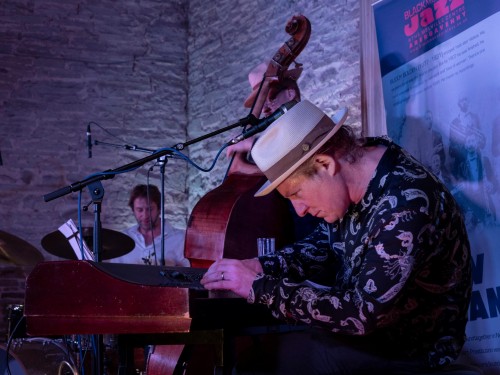
by Ian Mann
August 05, 2021
/ LIVE
"A jazzman for all seasons". Guest contributor Nigel Jarrett enjoys the New Orleans inspired music of pianist / vocalist Dom Pipkin and his trio.
Dom Pipkin Trio
“New Orleans Comes to Wall2Wall”
The Barn, White House Farm, Llanvetherine, Abergavenny, 04/08/2021
Part of Wall2Wall Jazz Festival 2021
Dom Pipkin – piano, vocals, Nick Kacal – bass, Jimmy Norden - drums
Barnstorming singer and piano man Dom Pipkin knows a bit about – well, barns. He revealed as much at this gig presented in one at White House Farm, Llanvetherine, in the fastnesses of the Monmouthshire countryside and courtesy of the owners, Julian and Clarissa Fonseca.
It was the third of a series of five gigs there being organised by Abergavenny’s Black Mountain Jazz and featuring musicians who have been filming sessions in the town for streaming in the autumn as the 2021 Wall2Wall Jazz Festival – a ‘virtual’ event for the second year running.
All-action Dom, in piano trio format here and famed as the UK musician who has fired up the New Orleans style of R&B singer-pianists in Europe, was in his very early days at an event in a Tintern barn or similar structure at which a musician from the British space-rock band Hawkwind was present. It was a planetary conjunction. As for being at home in the countryside, he was married in the Black Mountains four years ago and clearly has an affinity for the place.
Agricultural buildings aside in a moment, the venue for these evening events has been made more grandiose by the substitution of a couple of capital letters, and is known for the occasion as The Barn. It’s a bluesy wail or two away from New Orleans, which Pipkin has visited many times to imbibe one of its most important characteristics: that there’s hardly anything as narrowly-defined as ‘New Orleans jazz’, a term which in any case is customarily used to describe what was being played by bands in the Crescent City at the turn of the 20th century. On the contrary, New Orleans is not only multifarious musically but also self-contained as a place where musicians have continued to perform without joining the diaspora to places such as New York, Chicago and the West Coast.
It thus presents a musical tapestry to which one can make one’s own contribution without unravelling the weave. Dom’s piano playing (at this gig performed on the mimicking electronic keyboard) is a fascinating mixture of barrelhouse, rock & roll and modern jazz, all deployed to a single-minded musical purpose alongside Dom’s own take on rollicking vocals. It also has its own brand of two-fisted virtuosity, so that it might be described, with tongue planted only lightly in cheek, as Dr John by Fats Domino out of McCoy Tyner. Add the lively drumming of Jimmy Norden and the depth of long-time Pipkin associate Nick Kacal’s bass and Dom took off into worlds of his own, but ones sealed hermetically to a tradition.
It got down to first principles in Professor Longhair’s “Mardi Gras in New Orleans (Go to the Mardi Gras)” and introduced an element that probably not many know about in Donald ‘Duck’ Harrison’s phonetic “Jakimo-Fi-Na-Hey”. Saxophonist Harrison is not only a former member of Art Blakey’s Jazz Messengers, and thus as hard a hard-bopper as they come, but also chief of a tribe of ‘Mardi Gras Indians’ in the city. They are black revellers who dress up at carnival time. Given a blistering performance here, the chart featured Norden whacking everything in sight with hand, foot, sticks, and tambourine in keeping immaculate time with super-duper energy and control.
Pipkin’s own take on the culture he has immersed himself in was reflected in some original material, including the tender “I Love You”, written for his wife, and the boisterous (if hardly believable) “I Don’t Want To Go Back To New Orleans”, a piece charged with binary rhythms and with echoes at one point of Ska. His “Take the Whole” was written locally and is a philosophical meditation on song-writing’s hits and misses, proving that New Orleans can even take in philosophical meditation conceived in the Welsh hills. Also compassionate was “Love Affair with New Orleans”, taken from his excellent solo album “C’Mon Sunshine”, which also includes “Heading South”, here played as an exuberant keyboard thrash.
Homage was paid to Crescent City pianist Huey Piano Smith, with his “Rockin’ Pneumonia and Boogie Woogie Flu”. It came with a bit of pop arcana: that Smith’s orchestra backed musicians such as Little Richard, who couldn’t rise to full expectation. Not many people know that; they might also not know how much variety there is in the so-called New Orleans mode and manner, something Dom explores on the album, with its take on vaudeville and church traditions, among others.
As Dom said before the trio performed Hughie Cannon’s “Bill Bailey” as a finale, jazz is multi-coloured and not to be confined. He might also have quoted the poet and jazz critic Philip Larkin, who described jazz as “the music of happy men”. Larkin should have included women and added the rider that jazz was born in misery and deprivation, but we know what he meant. He meant music as Dom performs it – Dom Pipkin, a jazzman for all seasons.
NIGEL JARRETT